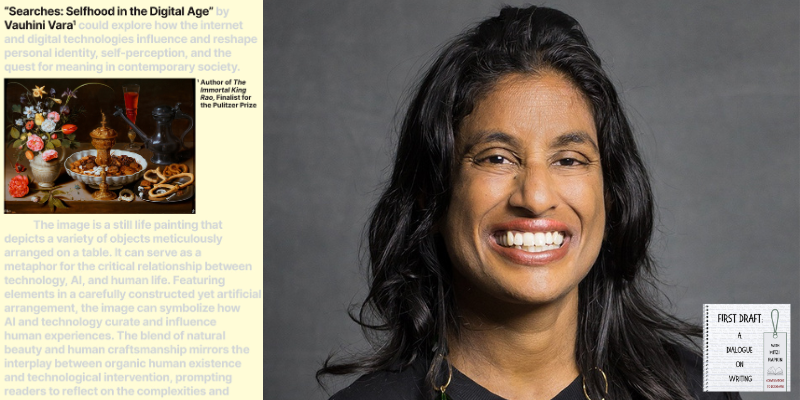
Vauhini Vara on the Wild Card of AI
In Conversation with Mitzi Rapkin on the First Draft Podcast
First Draft: A Dialogue of Writing is a weekly show featuring in-depth interviews with fiction, nonfiction, essay writers, and poets, highlighting the voices of writers as they discuss their work, their craft, and the literary arts. Hosted by Mitzi Rapkin, First Draft celebrates creative writing and the individuals who are dedicated to bringing their carefully chosen words to print as well as the impact writers have on the world we live in.
In this episode, Mitzi talks to Vauhini Vara about her new book, Searches.
Subscribe and download the episode, wherever you get your podcasts!
From the episode:
Mitzi Rapkin: I wanted to ask you about a part in Searches that definitely concerns writers and readers where you’re looking at the models that this AI technology is using to learn large amounts of language, and you have a quote in there that I love from someone named Gideon Lewis-Kraus that says “you are not what you write, but what you have read.” You start talking about the ways in which AI is using writer’s work to train itself. There’s a huge lawsuit going on right now with Meta about this. And then there’s a woman in there who says, I would rather tell AI a few elements of the story and have AI write the story that I will read to my child because that is more meaningful than what I’m finding out there. That really struck me and deeply hurt my feelings because I think part of the reason we also read is for empathy. I wouldn’t want to read my kids only a story that I could create. This is about reading into the gift that you get when you read a book because you get to enter the mind of someone else.
Vauhini Vara: I mean, that’s a wild card for me. I think we as writers can sort of talk all we want about what AI doesn’t accomplish for us, like I was doing earlier, and talking about trying to write an essay using AI and finding it all fell short. That’s all well and good. But ultimately, books are products by the time we put them into the world, and in order to have careers as writers, there needs to be people willing to read those books, and not just to have careers, in order for the art, I would argue, to exist, it needs to be co-created by a reader and a writer. That’s where the magic takes place. If I write a book and nobody reads it, you know, there’s something incomplete there in the in the work itself. And so given that, it is incumbent upon readers to decide, again, what is valuable to them about literature. And I think this is where my husband’s proposed conception of literature as necessarily being human created is valuable because if readers decide, listen, knowing that there is a human being on the other side of this text, knowing that what’s happening here is a communication between me and whoever wrote these words down is fundamental to my experiences of reading. If readers decide that, then this AI thing is a non-starter, then AI doesn’t matter. However, if readers decide it’s all about the text on the page; I don’t care where that text came from. As long as it’s entertaining to me, compelling to me, even moving to me, then you know, that becomes an existential problem for us as writers and for us as a literary society. The AI model I used to write that essay Ghosts didn’t convey my experience, but I did argue in the book that the AI model did produce text that I found very moving at times. And so how do I square that as a reader with my desire for literature to be human created? What does it mean that I as a reader read some of the text that the AI model produced and thought like, wow, this is really beautiful. What if that’s enough? The question is, what it enough? And I would like for the answer to be no, but that it’s not for me to say.
***
Vauhini Vara has been a reporter and editor for The Atlantic, The New Yorker, and the New York Times Magazine, and is the prize-winning author of The Immortal King Rao and This is Salvaged. She lives in Fort Collins, Colorado. Her new nonfiction book is called Searches.
First Draft: A Dialogue on Writing
First Draft: A Dialogue on Writing is a literary podcast produced and hosted by Mitzi Rapkin. Each episode features an in-depth interview with a fiction, non-fiction, essay, or poetry writer. The show is equal parts investigation into the craft of writing and conversation about the topics of an author’s work.



















